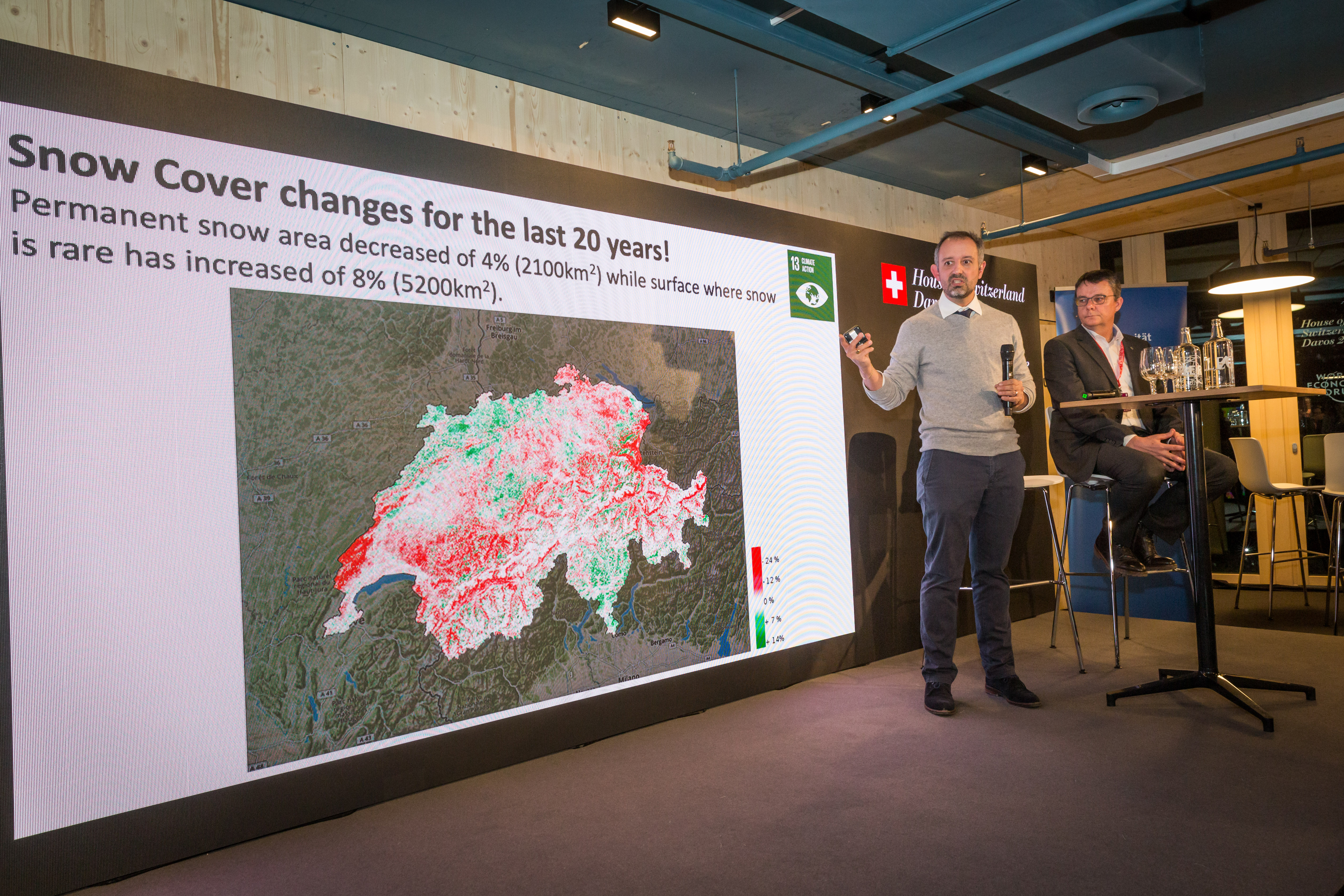WEF 2020
During the World Economic Forum Annual Meeting 2020 in Davos, the University of Zurich and the University of Geneva jointly presented two innovative projects. The Swiss Data Cube delivers a unique near real-time capability to track various environmental changes and provides an innovative technology to ensure environmental protection, assess risks or document progress in sustainability policy. For its part, acceleRare is a public-private-patient partnership aiming to bring together existing resources and researchers on rare diseases to develop new drugs and therapies.
Swiss Data Cube
The project was presented during an event organized by the House of Switzerland in Davos on 23 January 2020, by Gregory Giuliani, senior lecturer and head of Digital Earth Unit and Swiss Data Cube project leader at GRID-Geneva, UNIGE Institute of Environmental Science (ISE), and Michael Schaepman, professor at the UZH Department of Geography and now President of the University of Zurich.
The project is part of a collaboration agreed in 2019 between the University of Zurich, University of Geneva, the Swiss Federal Institute for Forest, Snow and Landscape Research (WSL) and UNEP/GRID-Geneva – with the aim of using Earth observation data to strengthen national environmental monitoring. The SDC collects all available data from the American Landsat programme and the European satellite series Sentinel 1 and 2 since 1984 to present.

SDC technology provides access to data visualization of the satellite images. This access significantly improves the way users can interact with the data and simplifies the use of the satellite pictures. The added value of this technology is that the most relevant data for Switzerland is selected, gathered in one place, and its accessibility guaranteed in the longer term. The aim is to keep the data as approachable as possible, also without specialist knowledge.
According to Giuliani, “The Swiss Data Cube is an ideal tool to monitor the global sustainable development goals in terms of climate change, water quality, urbanisation or biodiversity and to document them for Switzerland.” And Michael Schaepmann is convinced that “the climate issue cannot be denied. We have to draw attention to it and show that we can make a difference with modern technology.”

Not only does the SDC gather data but more so can provide information for policy recommendations, spatial planning and environmental assessments. It is hoped that this technology will foster cooperation, ideas and projects and strengthen expertise at national and international level which yields possibilities to compare the results and make better predictions on the development of biodiversity.
AcceleRare
The project AcceleRare, which seeks to combine efforts to create new treatments for rare diseases, was introduced in the framework of a high-level luncheon taking place during the Annual Meeting in Davos. The project was presented by Leonardo Scapozza, professor and head of Pharmaceutical Biochemistry/Chemistry at the UNIGE, along with Jonathan Hall, professor and head of Pharmaceutical Chemistry at the ETH Zurich and Olivier Devuyst, professor and head of Mechanisms of inherited kidney disorders group at the UZH. The presentation showed how this project could inspire national and international stakeholders to come together in order to offer a brighter future to those affected by rare diseases.

The researchers based their approach on the observation that threat caused by rare diseases, affecting around half a million people in Switzerland, is often underestimated. As a consequence, resources and researchers are spread out. To encourage joint efforts, the researchers aim to create a research platform about rare diseases. The objective is to foster collaboration between different important stakeholders such as patient advocacy groups, scholars and the pharmaceutical industry.
Read more about it
UNIGE
https://www.unige.ch/internationalrelations/en/iosngos/pre/events/wef-davos-summit/
UZH
https://www.news.uzh.ch/de/articles/2020/UZH-am-WEF.html
https://www.media.uzh.ch/de/medienmitteilungen/2019/Schweizer-Data-Cube.html
Picture credit for the header: Evangeline Shaw
Picture credit for the article, from top to bottom: Monique Aravantes, Sébastien Crettaz, Michael Longmire